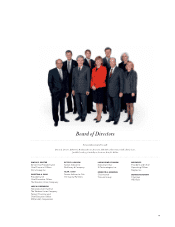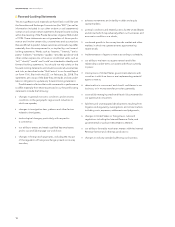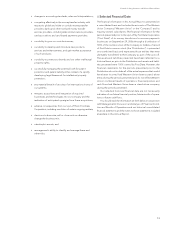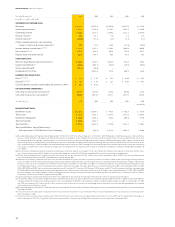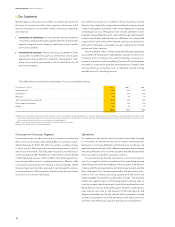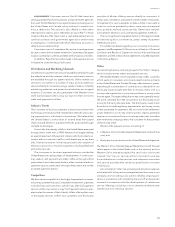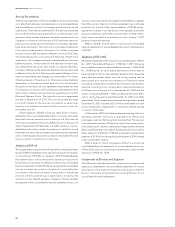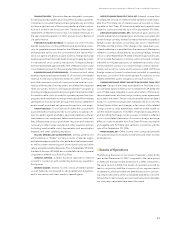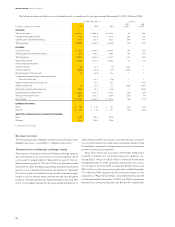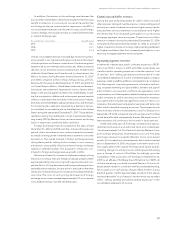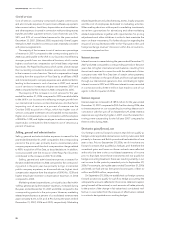Western Union 2007 Annual Report Download - page 21
Download and view the complete annual report
Please find page 21 of the 2007 Western Union annual report below. You can navigate through the pages in the report by either clicking on the pages listed below, or by using the keyword search tool below to find specific information within the annual report.19
Our Business
CASH PAYMENTS.
Consumers use our Quick Collect service to
send guaranteed funds to businesses and government agencies
from over 50,000 Western Union agent locations primarily across
the United States and Canada, using cash and, in certain loca-
tions, a debit card. This service is also offered in other select
international locations, and is referred to as Quick Pay
SM
in those
locations. We also offer Quick Cash, a cash disbursement service
used by businesses and government agencies to send money
to employees or individuals with whom they have accounts or
other business relationships.
Consumers use our Convenience Pay service to send payments
by cash or check from a smaller number of Convenience Pay agent
locations primarily to utilities and telecommunication providers.
In addition, Pago Fácil provides a walk-in bill payment service
in Argentina under the Pago Fácil brand.
Distribution and Marketing Channels
Our electronic payment services are available primarily through
the telephone and the internet, while our cash-based services
are available through our agent networks. Billers market our
services to consumers in a number of ways, and we market our
services directly to consumers using a variety of means, including
advertising materials and promotional activities at our agent
locations. Consumers can also participate in the Western Union
Gold Card program when using our Quick Collect service to
make cash payments to billers.
Industry Trends
The consumer-to-business payment industry has evolved with
technological innovations that created new methods of process-
ing payments from individuals to businesses. We believe that
the United States is in the midst of a trend away from paper
checks toward electronic payment methods accessible through
multiple technologies.
Historically, the majority of bills in the United States were paid
through checks in the mail. In 1989, Western Union began offering
an agent-based cash bill payment solution which provided con-
sumers with a convenient, walk-in, cash-based way to pay their
bills. Further innovation in the industry led to the creation of
electronic options for consumer payments including telephone
and online services.
The consumer-to-business payment industry outside the
United States is at varying stages of development. In some coun-
tries, walk-in cash payments at a biller’s offi ce or through a third
party network are widely used, while in other countries electronic
payment options, particularly through direct debit, are widely
accepted payment options.
Competition
We face robust competition in the highly-fragmented consumer-
to-business payment industry. Competition in electronic payments
includes financial institutions (which may offer bill-payment
services in their own name or may “host” payment services oper-
ated under the names of their clients), billers offering their own
or third-party services to their own customers, and third-party
providers of all sizes offering services directly to consumers. In
many cases, competitors specialize in a small number of industries.
Competitors for cash payments include a biller’s own walk-in
locations, or those provided by others, some only on a regional
basis, as well as mail and courier services. There is also competi-
tion between electronic and cash-based payments methods.
The most signifi cant competitive factors in this segment relate
to brand recognition, convenience, speed, variety of payment
methods and price.
For additional details regarding our consumer-to-business
segment, see Management’s Discussion and Analysis of Financial
Condition and Results of Operations and our historical fi nancial
statements and the notes to those statements included elsewhere
in this Annual Report.
Other
Our remaining business units are grouped in the “Other” category,
which includes money orders and prepaid services.
We market Western Union branded money orders, issued by
a third-party, to consumers at non-bank retail locations primarily
in the United States and Canada. Money order revenue is gener-
ated through a combination of commissions collected from our
third-party issuer and per item fees for money orders sold. In a
money order transaction, a consumer purchases a money order
from an agent. The agent selling the money order generally remits
the funds collected from the consumer to our third party issuer
promptly following the sale date. The third-party issuer holds
those funds to meet regulatory requirements and to pay money
orders presented for payments. We do not hold the settlement
assets related to our money order business. Agents generally
receive no commissions from us on money order sales, but rather
earn revenue by charging a fee to the consumer for the purchase
of the money order.
We also offer prepaid services consisting of:
||
a Western Union branded prepaid MasterCard card and Visa
card; and
|| third-party top-up services in the United States and Argentina.
The Western Union branded prepaid MasterCard is sold through
select agents in the United States and on the internet, and our
Western Union branded prepaid Visa card is also sold on the
internet. Our “top-up” services allow consumers to pre-pay
for mobile phone or other services, and otherwise store value
with service providers that can be accessed by the consumer
in the future.
Also included in “other” are recruiting and relocation expenses
associated with hiring senior management positions new to our
company, and consulting costs used to develop ongoing pro-
cesses in connection with completing the spin-off; and expenses
incurred in connection with the development of certain new
service offerings, including costs to develop mobile money
transfer and micro-lending services.


